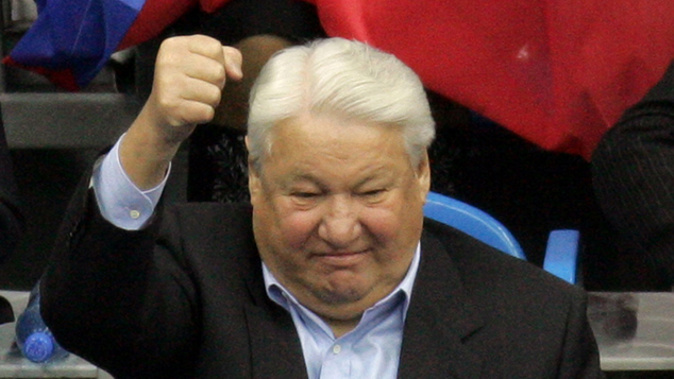
Highlights in history on this date:
303 - Death of St George, the patron saint of England.
1014 - High King of Ireland Brian Boru is killed repelling Viking invaders at the battle of Clontarf.
1533 - Catholic Church inquiry declares the marriage of Catherine of Aragon to England's King Henry VIII void.
1616 - Death of Spanish novelist Miguel de Cervantes Saavedra, whose works included Don Quixote.
1661 - Charles II is crowned King of England.
1728 - Fire destroys a large part of Copenhagen.
1788 - NSW Governor Arthur Phillip selects the site of Parramatta.
1848 - French voters, with universal male suffrage for the first time, go to the polls to elect a national assembly.
1850 - Death of William Wordsworth, British poet, aged 80.
1896 - The Vitascope system for projecting movies onto a screen is demonstrated in New York City by Thomas Edison.
1915 - Rupert Brooke, British World War I poet, dies of blood poisoning off Skiros, Greece.
1918 - Royal Navy under Admiral Keyes raids the German submarine base at Zeebrugge in World War I.
1938 - Sudeten Germans in Czechoslovakia demand full autonomy.
1940 - About 200 people die in dance-hall fire in Natchez, Mississippi.
1941 - King George of the Hellenes and the Greek government flee the Greek mainland from advancing Germans during WWII, and the Greek army surrenders.
1945 - Field Marshal Herman Goering sends a telegram to Adolf Hitler, besieged in Berlin, proposing he take control as Hitler's deputy. Hitler orders his immediate arrest.
1964 - Unknown attackers saw off the head of Copenhagen's trademark, the Little Mermaid statue. The head is never found and a new one is made and attached.
1969 - Sirhan Sirhan is sentenced to death for the assassination of US Senator Robert F Kennedy, a sentence later reduced to life imprisonment.
1972 - Two US Apollo 16 astronauts blast off from the moon and rejoin command ship for journey back to earth.
1975 - South Vietnam's cabinet resigns as panic grips Saigon and US President Gerald Ford declares the Vietnam War is over.
1980 - Saudi Arabia expels the British ambassador following the showing on British TV of Death Of A Princess, which depicts the life and death of a Saudi Arabian princess.
1985 - The Coca-Cola Co announces it is changing the secret flavour formula for Coke, but negative public reaction later forces the company to resume selling the original version.
1986 - White-led South African government commits itself to scrapping dozens of laws restricting movements of blacks.
1986 - Death of Jim Laker, Surrey and England cricketer, best remembered for taking a record 19 wickets in one test match for only 90 runs against Australia in 1956.
1988 - A truck rigged with explosives rips through a vegetable market in Tripoli, Libya, killing 54 people and wounding 125.
1990 - Major flooding hits Nyngan, NSW.
1990 - Death of Paulette Goddard, US film actress and former wife of Charlie Chaplin.
1992 - President F W de Klerk of South Africa proposes to hold a multiracial election; Indian film director Satyajit Ray dies three weeks after being awarded a lifetime achievement Oscar.
1993 - Lalith Athulathmudali, Sri Lanka's top opposition leader, is assassinated.
1994 - Two African National Congress activists are killed in South Africa as they try to put up election posters.
1995 - Hideo Murai, number two official in the Aum Shinri Kyo sect accused of involvement in fatal gas attacks in Tokyo, is assassinated outside the sect's headquarters.
1996 - Former Labor prime minister Paul Keating resigns from federal parliament, ending a 27-year political career; Fire races through deserted villages around the Chernobyl nuclear plant in Ukraine, sending radioactive particles skyward, 10 years after the world's worst nuclear accident.
1998 - Death of James Earl Ray, the ex-convict who confessed to assassinating the Rev Martin Luther King Jr in 1968 and then insisted he was framed.
1999 - On the first day of a 50th anniversary NATO summit in Washington, Western leaders pledge to intensify military strikes against Yugoslavia.
2000 - A group of 21 tourists and workers is kidnapped from a Malaysian diving resort by Abu Sayyaf rebels.
2001 - After a 12-hour stand-off at an Istanbul hotel, 13 pro-Chechen gunmen surrender to police, releasing 120 hostages unharmed.
2002 - Pope John Paul II opens a meeting at the Vatican with 12 of the 13 US cardinals and the heads of the US Conference of Catholic Bishops about the mishandling of sexual abuse cases in the US church.
2003 - The US and North Korea hold their first direct talks in Beijing since North Korea admitted it had been secretly pursuing a nuclear weapons program.
2004 - US President George W Bush takes steps to restore normal trade and investment ties with Libya as a reward to Muammar Gaddafi for eliminating Libya's biological, chemical and nuclear weapons programs.
2005 - A Yemeni court upholds the death sentence of a Muslim extremist convicted of assassinating a prominent politician in 2002 and helping to plot an attack that killed three American missionaries.
2006 - Hungary's Socialist-led governing coalition wins run-off parliamentary ballots, becoming the nation's first administration to win re-election since communism fell.
2007 - Former Russian President Boris Yeltsin dies at the age of 76.
2008 - The Olympic flame arrives in Australia for the next leg of the torch relay and is immediately whisked away to a secret location to avoid anti-China protesters.
2009 - Suicide bomb blasts tear through crowds waiting for food aid in central Baghdad and inside a roadside restaurant filled with Iranian pilgrims Thursday, killing at least 78 people in Iraq's deadliest day in more than a year.
2010 - The US and NATO agree to start transferring control of Afghanistan back to its leaders by year's end but acknowledge that achieving stability will take decades.
2011 - A nervous leadership in Iran imposes a media blackout on President Bashar Assad's struggle against a swelling Syrian uprising and Tehran faces the unsettling prospect of losing its most stalwart ally in the region.
2012 - Sudanese warplanes bomb a market and an oil field in South Sudan, killing at least two people after Sudanese ground forces had reportedly crossed into South Sudan with tanks and artillery, elevating the risk of all-out war between the two old enemies.
2013 - NSW becomes the first state to sign the schools funding agreement with the Commonwealth; A car bomb explodes outside the French embassy in the Libyan capital Tripoli, wounding three people and partially setting the building on fire.
2014 - Australian government announces it will spend $12 billion on 58 new F-35 Joint Strike Fighters; The founder of Russia's leading social media network leaves his post as chief executive and flees the country as cronies of President Vladimir Put have made steady inroads into the company's ownership.
Take your Radio, Podcasts and Music with you









